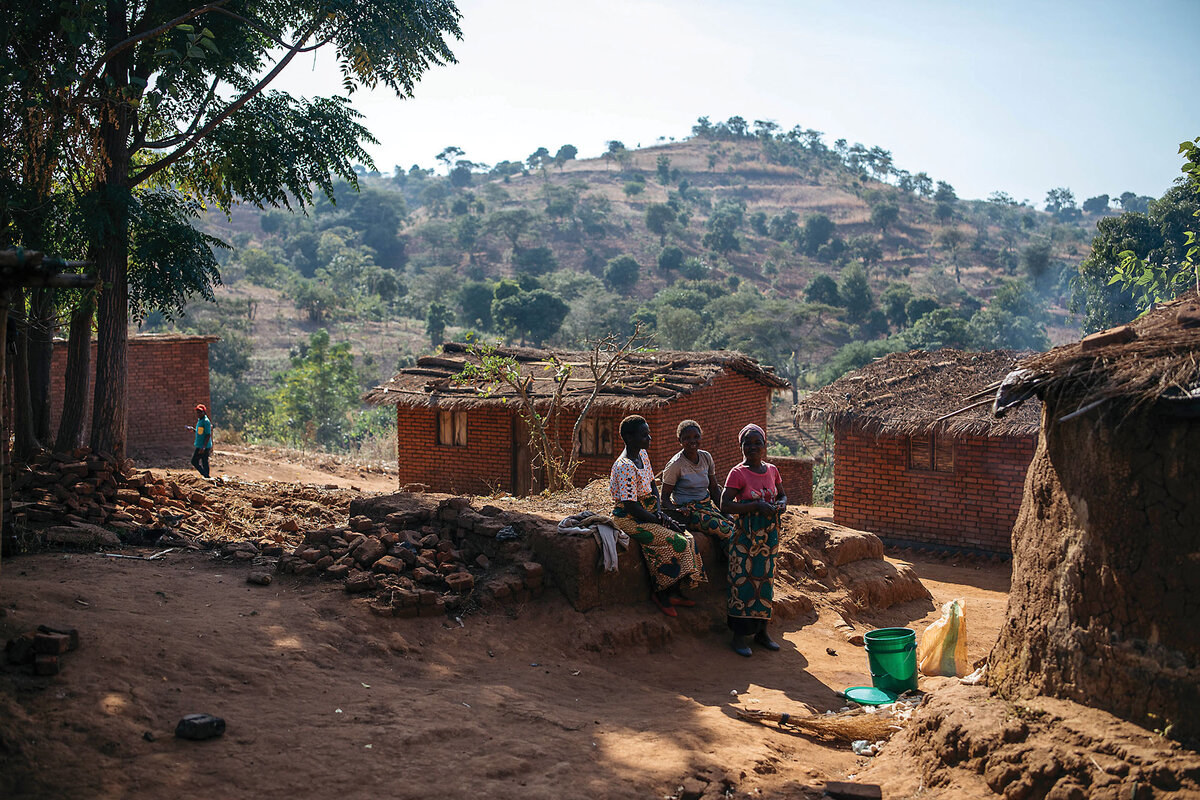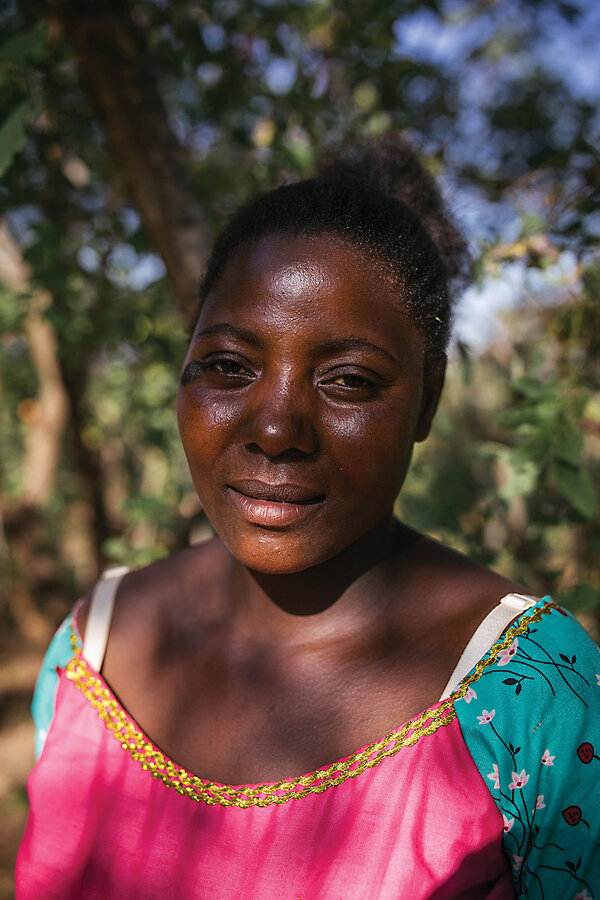In Malawi, sex and mental health can be taboo topics. Not on this radio show.
Loading...
| Undi, Malawi
The weekly radio show “Spot On: Kalikonse Tikadziwe” takes on topics that are taboo in the village of Undi and throughout Malawian society. Today’s subject is menstruation.
Lee Chatata, a producer for Farm Radio Trust, reads from a script, engaging a group of assembled women with questions about the stigma related to having a period. “What challenges do girls face when they’re menstruating?” Mr. Chatata asks.
Why We Wrote This
A story focused onMany young people in Malawi find there’s no space to discuss sensitive issues. The intimate medium of radio has the power to change that.
Several young women, some toting infants on their hips, take turns responding.
“There are difficult cultural beliefs, such as how a girl on her period isn’t allowed to cook or put salt in the relish,” says Alefa Biziel, who has a baby girl.
“At school, boys laugh at the girls when they find out she is on her period,” Tiyanane Samuel chimes in.
“The lack of sanitary pads is hard,” Bridgette Kachala says. All the women nod.
Listeners around the country are encouraged to phone in to Farm Radio Trust’s call center afterward with thoughts or questions, thus continuing the dialogue. Each episode reaches 5 million listeners.
Seated beneath the branches of a massive African fig tree, the audience of nearly 25 women is listening intently. A solar panel set up not far away powers the devices that Lee Chatata, a producer for Farm Radio Trust, is using to tape the program in this makeshift recording session.
Called “Spot On: Kalikonse Tikadziwe” (meaning “To Know Everything” in Chichewa, the local language), the weekly radio show tackles topics that are taboo in the village of Undi and throughout Malawian society. Today, the subject is menstruation.
Mr. Chatata reads from a script, engaging the assembled women with questions about the stigma related to having a period.
Why We Wrote This
A story focused onMany young people in Malawi find there’s no space to discuss sensitive issues. The intimate medium of radio has the power to change that.
“What challenges do girls face when they’re menstruating?” Mr. Chatata asks. Several young women, some toting infants on their hips, take turns responding.
“There are difficult cultural beliefs, such as how a girl on her period isn’t allowed to cook or put salt in the relish,” says Alefa Biziel, who has a baby girl.
“At school, boys laugh at the girls when they find out she is on her period,” Tiyanane Samuel chimes in.
“The lack of sanitary pads is hard,” Bridgette Kachala says.
All the women nod.
“I was afraid”
Undi, in the central Ntchisi District, is just one of the many remote, underserved villages in this southeastern African nation. More than half of Malawians live below the poverty line. The average monthly income for informally employed residents in rural places such as Undi – where more than 80% farm for a living – is 90,000 kwacha (about $50). Buying sanitary pads, which cost around 1,900 kwacha for a pack of 10, on a monthly basis is typically out of the question. Most women and girls in Undi instead use fabric strips cut from traditional wrap skirts.
When Ms. Biziel got her first period, the changes in her body were met with something akin to vitriol by older women in her community. At age 12, she was called before her parents, who berated her. Now that she was a woman, they said, she was expected to behave. “You’re not supposed to be sleeping with men; you have to learn to control yourself,” Ms. Biziel recalls her mother saying.
There was no mention of how to manage painful menstrual cramps or how to keep herself clean and comfortable – particularly given the lack of privacy at Chasembe, the local school. The outdoor latrine there is dirty and smelly, Ms. Biziel explains, which is one reason that some girls drop out of school when their periods start.
“There was so much I wanted to ask my mother about what a lady should do,” Ms. Biziel continues. “But I was afraid.”
Ms. Biziel married her husband when she was 18 years old and gave birth to their daughter that same year.
Many young Malawians rush into marriage, particularly those who say they experienced abuse at home as girls. And many parents wish to marry off daughters early so that they can bring in food or money through a dowry, explains Rebecca Samuel (no relation to Tiyanane Samuel). “I was banned from seeing my friends until I found a husband,” she says.
Uplifting communities
“Spot On” episodes are recorded in the mostly rural Ntchisi and Dowa districts, and in Lilongwe District, which includes the capital. Listeners around the country are encouraged to phone in to Farm Radio Trust’s call center afterward with thoughts or questions, thus continuing the dialogue. Each episode reaches 5 million listeners.
The Canadian nonprofit Farm Radio International, the umbrella organization for Farm Radio Trust, was established in the early 1980s by radio broadcaster George Atkins, who hoped to use radio programming to uplift communities in the Global South, says Ian Pringle, Farm Radio International’s senior director of programs.
“Atkins really believed in the power of radio for rural communities, primarily agricultural,” Mr. Pringle explains in a phone call from Ottawa, Ontario, where he is based.
Born in 2009, Farm Radio Trust has always been “a truly local, indigenous communications program,” Mr. Pringle notes. “It was never directly funded by [Farm Radio International]. We have collaborations, of course. But it was never run by foreigners.”
George Vilili, Farm Radio Trust’s CEO, says that it didn’t take long for the Malawian team to notice radio’s potential beyond addressing farming topics. Listeners generally resided in remote outposts, facing high unemployment rates and virtually no access to social services. “Our first project in 2013 was on mental health and issues that young people face, which include suicide, teenage pregnancy, questions around sexuality,” says Mr. Vilili, speaking by phone from Lilongwe. “There wasn’t a space for discussions on these topics.”
Generational gaps proved to be another hurdle. “Parents didn’t like youth discussing taboo topics like sex in their absence, but that’s what the youth want,” Mr. Vilili continues. During site visits to record programs, Farm Radio Trust steps in to mediate discussions with parents – patiently explaining the purpose of broaching taboos.
Kantambo Longwe, a communications specialist with the United Nations, works with Farm Radio Trust on agricultural and community initiatives, including radio programs, toll-free call centers, and text messages to raise awareness on issues concerning water, sanitation, and hygiene. Mr. Longwe praises Farm Radio Trust’s collaborative work.
“This collaboration has helped the areas where FRT has been working,” he says.
“FRT is actually doing it, not just talking,” says Mr. Pringle, who visits Malawi every couple of years. In addition to radio programs, Farm Radio Trust offers pop-up clinics in villages, often in partnership with grassroots nongovernmental organizations.
“It’s hard to talk about contraceptives,” Mr. Pringle says. “But to actually duck into the tent and be there to see the services [that Farm Radio Trust’s partners] offer: an injection, implant, condoms – a young Malawian kid can walk out with an understanding of why and how to use them, all in a confidential space.”
Rebecca Samuel says that women have listening parties for “Spot On.” Though she herself married last year at age 16, girls in the area are starting to reject early marriages and to chat about sensitive issues.
“We’re more educated now,” Ms. Samuel says. “I hope to do things a bit differently with my own daughter.”









